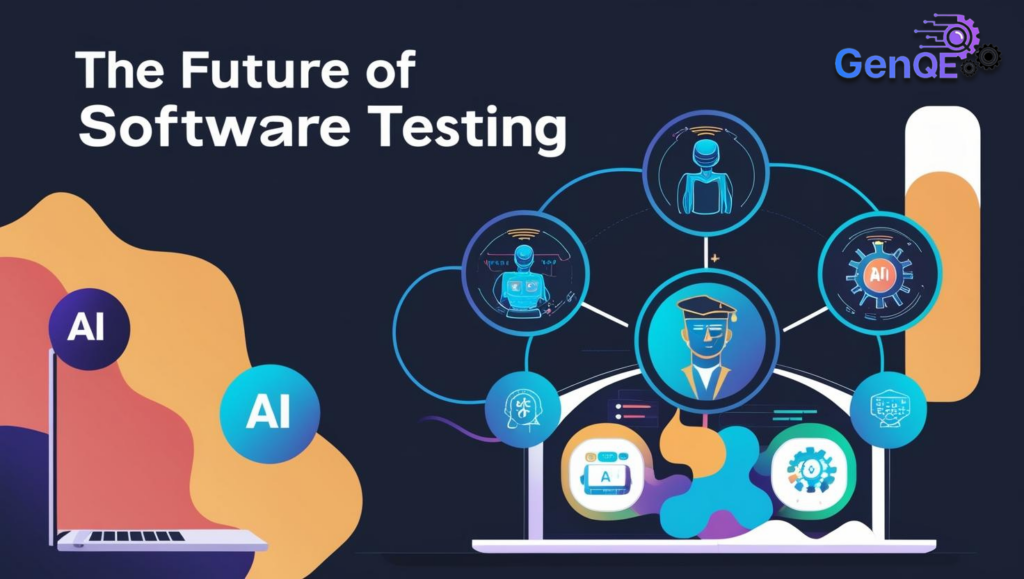
In the realm of software development, the significance of testing cannot be overstated. As digital solutions become increasingly complex, the traditional methods of quality assurance (QA) and testing face numerous challenges that can hinder efficiency and effectiveness. In today’s competitive market, where speed and reliability are paramount, these traditional approaches often fall short. This blog post explores the evolving landscape of software testing, emphasizing how artificial intelligence (AI) is revolutionizing this critical field, and introduces an innovative solution—GenQE—that embodies this transformation.
The rapid evolution of software applications demands a QA process that can not only keep pace but also predict and mitigate issues before they escalate. However, many organizations continue to grapple with outdated testing methods that are not only time-consuming but also prone to errors. This post will guide you through the new era of software testing, where AI-enhanced tools like GenQE are making significant strides in improving accuracy, reducing costs, and speeding up the testing process.
By the end of this exploration, you’ll understand the integral role that AI-powered testing platforms play in modern software development, and how they can be leveraged to achieve superior software quality. Whether you’re a QA professional, a software developer, or a project manager, this comprehensive discussion will provide you with actionable insights and a clear perspective on the future of software testing.
The Crux of Modern Software Testing Challenges

Software testing has historically been a bottleneck in the development process, often due to its labor-intensive and error-prone nature. As software systems grow in complexity, the manual creation and execution of tests become less feasible. Here, we delve into the core challenges that the software testing industry faces today.
Scaling with Complexity
As applications become more intricate, the number of scenarios to test can exponentially increase. This complexity makes it difficult for traditional testing methods to cover every potential interaction or system state, leading to gaps in test coverage. The challenge is further compounded by the need for multiple environment configurations and device types, each adding layers of variables to the testing matrix.
Speed vs. Quality Conundrum
In the agile world, the demand for rapid deployment conflicts with the need for thorough testing. Organizations struggle to maintain quality while accelerating their time to market, often having to compromise one for the other. This pressure results in either delayed releases due to extended testing cycles or, worse, compromised product quality due to insufficient testing.
Resource Intensiveness
Manual testing is not only slow but also costly. It requires significant human resources, and as the scope of testing expands, so does the need for more testers. This increase in human resources does not linearly translate to higher quality due to the variability in tester performance and potential human error. Additionally, the repetitive nature of certain testing tasks can lead to burnout and reduced effectiveness over time.
The Advent of AI in Software Testing

Artificial Intelligence is poised to address many of the challenges faced by traditional testing methodologies. AI can automate complex tasks, learn from data, and make decisions that would typically require human intelligence. This section explores how AI is integrated into various aspects of software testing.
Automated Test Creation
AI algorithms can analyze application data and user interactions to generate test cases automatically. These tests are often more comprehensive than those a human could conceive, covering edge cases that might otherwise be overlooked. Furthermore, AI can continuously adapt test scenarios in real-time as new features are developed, ensuring that test suites evolve alongside the software they are meant to validate.
Intelligent Test Execution
AI-driven tools can prioritize test cases based on risk and potential impact, focusing efforts on areas that are most likely to contain critical bugs. This not only improves efficiency but also enhances the effectiveness of testing procedures. By dynamically adjusting test plans based on ongoing results and trends, AI systems reduce the redundancy of testing efforts and concentrate resources where they are most needed.
Enhanced Accuracy and Speed
With AI, the speed of test execution and analysis is significantly improved. AI tools can rapidly assess and interpret test results, quickly identifying defects and learning from each iteration to refine the testing process continuously. This capability not only accelerates the pace of development but also helps ensure that products meet quality standards before they reach the market.
Introducing GenQE: A Paradigm Shift in Software Testing

In the context of AI-driven solutions, GenQE stands out as a transformative platform in software quality engineering. It epitomizes the integration of AI in testing through its robust features designed to tackle modern-day testing challenges.
AI-Driven Test Generation
GenQE leverages machine learning to automate the creation of test cases, significantly reducing the reliance on manual efforts while enhancing test coverage and effectiveness. By analyzing historical data and user behavior, it predicts and focuses on high-risk areas. This not only streamlines the testing process but also ensures that critical functionalities are rigorously evaluated.
Smart Test Execution
The platform’s capability to intelligently prioritize and execute test cases ensures that crucial functionalities are thoroughly tested before less critical aspects, optimizing the use of resources and time. GenQE’s advanced algorithms assess the impact of each test scenario, allowing teams to dynamically adapt their testing strategies in response to real-time feedback.
Self-Healing Automation
One of GenQE’s standout features is its self-healing mechanism. It automatically adjusts test scripts when application changes occur, thus maintaining the relevancy and accuracy of tests without human intervention. This feature is particularly valuable in agile environments where continuous integration and frequent updates are common.
Real-World Applications of AI in Testing

To illustrate the practical benefits of AI in software testing, let’s explore some real-world applications and case studies where AI-enhanced tools have made a measurable impact.
Case Study: E-commerce Platform
An e-commerce company implemented AI-driven testing to manage its complex, frequently updated product platform. The AI system was used to generate and execute tests daily, identifying issues before they affected customers. This not only improved the quality of the online shopping experience but also reduced the downtime associated with post-deployment bug fixes.
Enhancing Mobile App Reliability
A mobile application developer used an AI testing tool to simulate thousands of user interactions across different devices and operating systems. This extensive testing ensured that the app delivered a consistent and reliable user experience, significantly reducing negative reviews related to performance issues.
The Future Landscape: AI’s Role in Evolving Software Testing

As we look to the future, the role of AI in software testing is expected to grow even more significant. This section explores the potential developments and how they might further transform the QA field.
Predictive Analytics
AI could predict potential future bugs based on historical data and current code changes, allowing teams to preemptively address issues before they manifest in deployed software. This proactive approach could dramatically reduce the incidence of critical bugs and enhance user satisfaction.
Integration with Development Processes
AI testing tools will become more deeply integrated with continuous integration/continuous deployment (CI/CD) pipelines, facilitating real-time testing and development which will drastically reduce the lifecycle of software development. This seamless integration will enable developers to receive immediate feedback on their code, allowing for quicker adjustments and more efficient project progress.
Broader Scope of Testing
AI will expand its capabilities to more comprehensively test security, performance, and usability aspects of software, providing a more holistic approach to QA. This broader scope will ensure that all facets of software performance are thoroughly vetted, resulting in more robust and reliable applications.
Conclusion: Embracing AI for Superior Software Quality

The integration of AI into software testing represents a significant leap forward in our ability to develop high-quality software efficiently. Tools like GenQE not only streamline the testing process but also enhance its effectiveness, addressing both the speed and quality concerns of modern software development. As we move forward, the adoption of AI-driven testing tools will be crucial for organizations aiming to stay competitive in a rapidly evolving digital landscape. For those looking to explore these innovative solutions, diving into AI-powered testing platforms such as GenQE could be the first step towards transforming their software development and quality assurance strategies.
Remember, the future of software testing is not just about keeping up; it’s about staying ahead. Embracing AI in testing is no longer just an option; it’s a necessity for ensuring the delivery of superior software products.
Discover More Innovative Solutions
Want to learn more about the tools and technologies discussed in this article? Explore how these innovations can be tailored to your specific needs and workflow requirements.
Our team of experts is available to answer your questions and provide personalized insights into how modern solutions like GenQE can address your specific challenges.